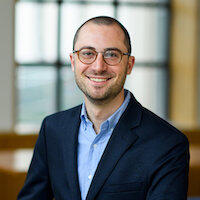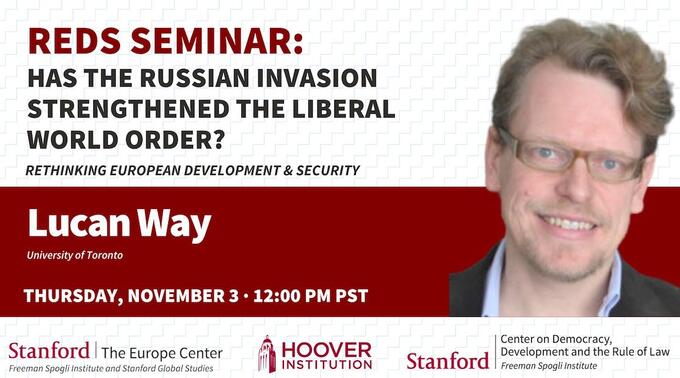Steve Fish | REDS Seminar: The Rebirth of the High-Dominance Liberal

Over the past decade, illiberal demagogues around the world have launched ferocious assaults on democracy. Embracing high-dominance political styles and a forceful argot of national greatness, they hammer at their supposed superiority as commanders, protectors, and patriots. Bewildered left-liberals have often played to the type their tormentors assign them. Fretting over their own purported neglect of the folks’ kitchen-table concerns, they leave the guts and glory to opponents who grasp that elections are emotions-driven dominance competitions.
Consequently, in America, democracy’s survival now hangs on the illiberal party making colossal blunders on the eve of elections. But in the wake of Putin’s attack on Ukraine, a new cohort of liberals is emerging in Central and Eastern Europe. From Greens to right-center conservatives, they grasp the centrality of messaging, nationalism, chutzpah, and strength. They’re showing how to dominate rather than accommodate evil. What can American liberals learn from their tactics and ways?
ABOUT THE SPEAKER

Steve Fish is a professor of political science at the University of California, Berkeley. He is the author of Democracy from Scratch, Democracy Derailed in Russia, and Are Muslims Distinctive? and coauthor of The Handbook of National Legislatures. He is currently working on a book manuscript entitled Comeback: Crushing Trump, Burying Putin, and Restoring Democracy’s Ascendance around the World.
REDS: RETHINKING EUROPEAN DEVELOPMENT AND SECURITY
The REDS Seminar Series aims to deepen the research agenda on the new challenges facing Europe, especially on its eastern flank, and to build intellectual and institutional bridges across Stanford University, fostering interdisciplinary approaches to current global challenges.
REDS is organized by The Europe Center and the Center on Democracy, Development and the Rule of Law, and co-sponsored by the Hoover Institution.

Perry Conference Room
Encina Hall, Second Floor, Central, C231
616 Jane Stanford Way, Stanford, CA 94305

 FSI researchers strive to understand how countries relate to one another, and what policies are needed to achieve global stability and prosperity. International relations experts focus on the challenging U.S.-Russian relationship, the alliance between the U.S. and Japan and the limitations of America’s counterinsurgency strategy in Afghanistan.
FSI researchers strive to understand how countries relate to one another, and what policies are needed to achieve global stability and prosperity. International relations experts focus on the challenging U.S.-Russian relationship, the alliance between the U.S. and Japan and the limitations of America’s counterinsurgency strategy in Afghanistan.
 Oxana Shevel is an Associate Professor of Political Science at Tufts University and current Vice President of the Association for the Study of Nationalities (ASN) and the American Association of Ukrainian Studies (AAUS). Her work explores nation building and identity politics in the post-Soviet region. Her book, Migration, Refugee Policy, and State Building in Postcommunist Europe (Cambridge University Press, 2011) won the American Association for Ukrainian Studies prize for best book in the fields of Ukrainian history, politics, language, literature and culture. Her recent work has focused on the sources of citizenship policies in the post-Communist states, comparative memory politics, and religious politics in Ukraine. With Maria Popova, she is currently writing a book on the root causes of the Russo-Ukrainian war, entitled Russia and Ukraine: Entangled Histories, Diverging States, scheduled to be released in late 2023.
Oxana Shevel is an Associate Professor of Political Science at Tufts University and current Vice President of the Association for the Study of Nationalities (ASN) and the American Association of Ukrainian Studies (AAUS). Her work explores nation building and identity politics in the post-Soviet region. Her book, Migration, Refugee Policy, and State Building in Postcommunist Europe (Cambridge University Press, 2011) won the American Association for Ukrainian Studies prize for best book in the fields of Ukrainian history, politics, language, literature and culture. Her recent work has focused on the sources of citizenship policies in the post-Communist states, comparative memory politics, and religious politics in Ukraine. With Maria Popova, she is currently writing a book on the root causes of the Russo-Ukrainian war, entitled Russia and Ukraine: Entangled Histories, Diverging States, scheduled to be released in late 2023. 

















